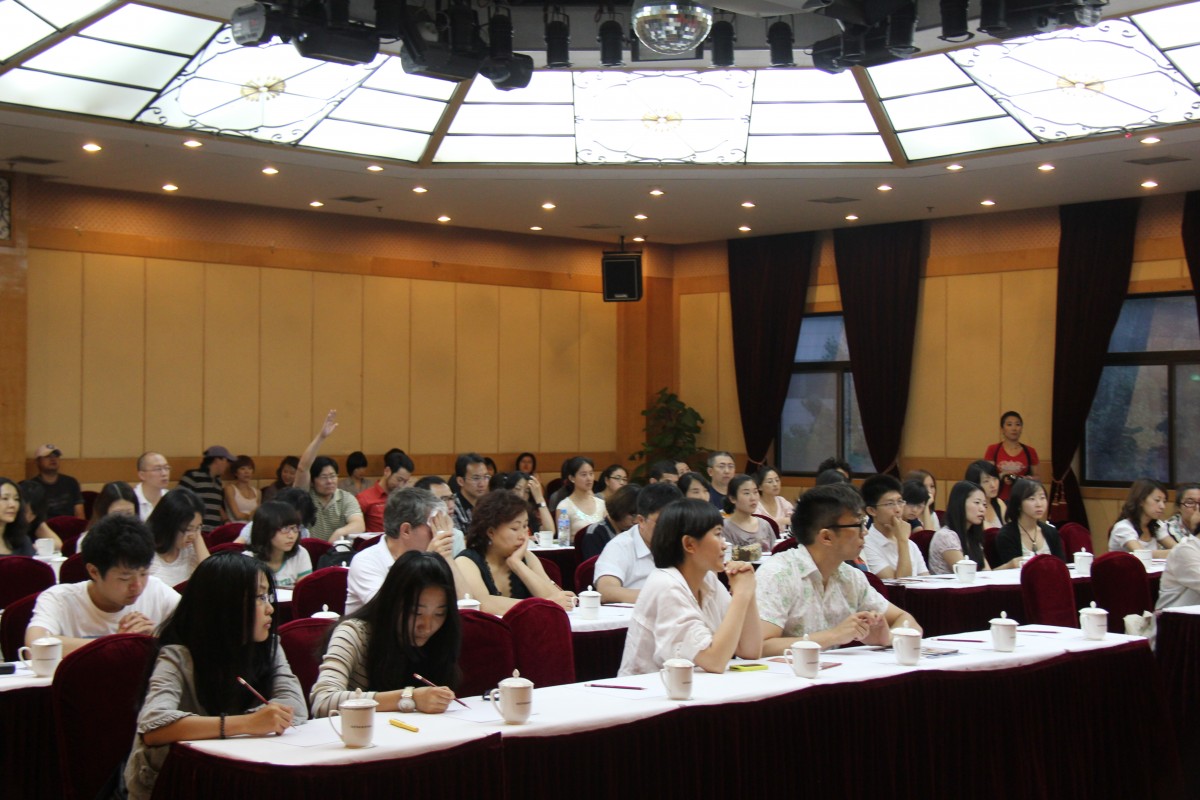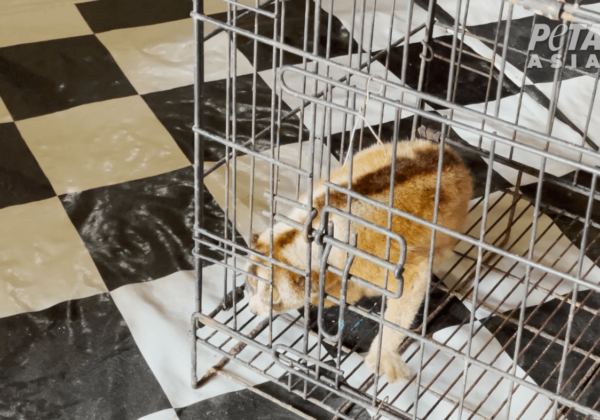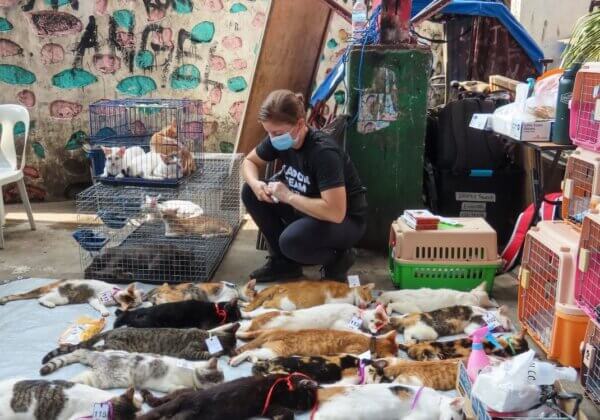Animal Rights: A Growing Movement in China

Participants at a PETA activist meeting in Shanghai
China has the world’s second largest economy and is home to one-sixth of the world’s population. It’s also home to some of the world’s worst animal abuses. Despite being a major player in the meat and fur industries and using animals in traditional Chinese medicines, the country has no comprehensive legislation in place to protect the animals who are used in these horrific trades. There are, however, laws that ensure that these animals continue to be harmed, such as the requirement that cosmetics sold in China be tested on animals.
With a huge population comes a huge demand for food, and China’s meat trade has grown exponentially. In fact, China now consumes twice as much meat as the United States and, at 71 million tonnes a year, and accounts for a quarter of the world’s meat supply. With such huge numbers comes huge suffering, and the lack of animal-protection legislation contributes to the horrific conditions that animals endure on factory farms and in slaughterhouses. Lax enforcement of laws protecting endangered species, including pangolins, giant salamanders, wild snakes, crocodiles, and owls, is bringing some species perilously close to extinction.
The controversial cat- and dog-meat trade routinely results in animals being stolen from their families or raised in horrifying conditions on severely crowded farms before they are jammed into cramped cages and transported, often without food or water, for what can be days on end. If they survive the trip to the market, it is commonplace for them to be bludgeoned to death in front of their companions.
Other animals raised for food have it little better. Cows are injected with water or forced to ingest it through the nose in order to increase their weight before slaughter—a cruel and unscrupulous way for farmers to increase profits. Thousands of dead pigs were found floating and rotting in the Huangpu River in March, possibly because of a crackdown on the black market that buys and sells diseased pigs. During an avian-flu outbreak in May, hundreds of thousands of ducklings were reportedly incinerated or sold as snake food.
An estimated 2 million cats and dogs are killed for their skins each year, in addition to millions of foxes, minks, and rabbits. When undercover investigators went into fur farms, they discovered unimaginable horrors. Before being skinned alive, animals were pulled from their cages, thrown to the ground, and bludgeoned with metal rods or slammed into hard surfaces. Some animals were still alive and struggling desperately when workers flipped them on their backs or hung them up by their legs or tails to skin them. Workers also stomped on the necks and heads of animals who struggled. When the fur was finally peeled off, animals’ bloodied bodies were thrown into a pile. Some were still alive, gasping, blinking, and dying in immeasurable pain. You can watch some of the disturbing video footage here.
China produces more than half of the world’s fur products, much of it for the U.S. and European markets. But a recent Reuters report noted that more than half of all the fur sold in the world is bought by consumers in China.
More specific to China is the traditional medicine trade, in which animals are routinely exploited in the name of unproven remedies. This includes an estimated 20,000 bears on bile farms. Kept in tiny cages, unable to stand or walk, the bears are “milked” for their bile, causing severe trauma, pain, infections, and death. Scientists have confirmed that the bile collected from bear farms is often contaminated with drug residues, blood, pus, germs, and cancerous cells. Synthetic alternatives are readily available, making the practice cruelly unnecessary.
Just as disturbing as the lack of animal-welfare legislation is the current requirement by the Chinese government that cosmetics products be tested on animals. Last year, over 300,000 animals were burned, poisoned, and killed in product tests in China, and approximately 15 million animals are subjected to these and other cruel experiments each year in China.
However, there are some changes afoot. PETA U.S. has already convinced many companies to pull out of the Chinese market until the country stops requiring that cosmetics be tested on animals. Thanks in part to a grant from PETA U.S., scientists in China are now being trained to make the switch to more accurate and humane non-animal testing methods.
More animal rights and grassroots movements are starting to gain ground as a result of the younger generation’s greater access to animal rights information and a changing political landscape.
More victories for animals in the region include: PETA Asia’s recent online anti-fur pledge campaign, “Fur Hurts,” received almost 350,000 signatures from all over China; the animated video “Runway Reversal,” donated by Ogilvy & Mather Beijing, went viral; many celebrities have pledged to PETA that they will not wear real fur; singer and actor Annie Yi’s compelling narration of a fur video received 250,000 views; the Ministry of Rural-Urban Development proposed an outline of a comprehensive ban on animal performances in zoos; the estimated number of vegetarians and vegans is up to about 50 million, meaning that China has far more vegetarians than the U.S. does; more and more consumers are looking online for cruelty-free cosmetics and personal products not registered for sale in China; retailers such as Les Enphants, Giordano, MUJI, and UNIQLO have all stopped selling wool from mulesed sheep after being informed by PETA or our international affiliates about the cruelty involved in the procedure; the Council of Agriculture of Taiwan is in the process of establishing a separate agency for animal protection rather than keeping it under the ruling of Animal Husbandry after letters from PETA supporters flooded in; the Canadian embassy in China has published a letter on its website in response to the thousands of letters and inquiries from PETA activists about Canada’s annual seal slaughter; and last but not least, with more than 50,000 followers on major social-networking sites, PETA is raising awareness of animal rights 24 hours a day.
Many celebrities in the region have also joined PETA’s efforts, including award-winning actors Bo-Lin Chen, Betty Sun Li, and Liu Xiaoqing; singer and TV presenter Show Luo; director Tian Yuan; Jackie Chan; and Hollywood hottie Maggie Q, to name just a few. A proposed draft of animal-welfare legislation was issued in September 2009, but there has not been any progress since then, with economic concerns being cited as a hurdle. But while we wait for regulations to catch up, complacency is starting to end. The animal rights movement in China is growing—and it’s exciting.
Posted by Hailey Chang









